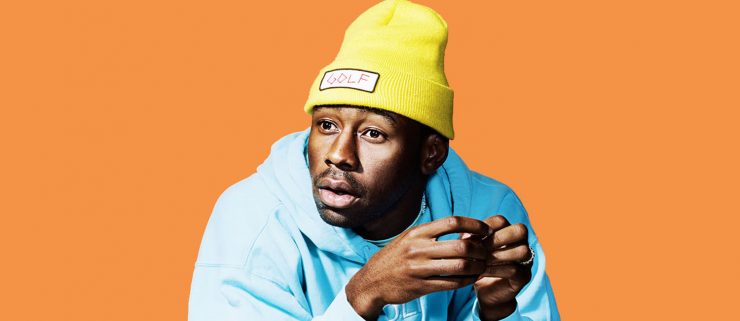Album Review: Tyler the Creator – Flower Boy
Album Review: Tyler the Creator - Flower Boy
I often ask myself; why do famous people keep working? Once I earned a certain amount, I’d stop and become a private citizen and enjoy a stress-free life. Californian rapper/clothing line designer/tv star Tyler, the Creator seems to have had the opposite reaction to his abundance of success. Following the release of Wolf, the final album in a pre-planned trilogy that was six years in the making, Tyler hinted he was done with music.
However, with the release of his fourth album Cherry Bomb, he announced that he’d had an epiphany. Following the completion of his trilogy, he felt the weight of fan expectation lift, so naturally, he was now free to do whatever he wanted. The end result was, in my opinion, an unfocused mess that tried too hard to be different to his previous work. Flower Boy represents a continuation of Tyler’s new artistic freedom, with a rediscovered focus and his patented sense of humour, loneliness and energy.
Flower Boy has been making waves since it leaked online shortly before its release, with many fans picking out lyrics that that seemed to indicate Tyler was coming out of the closet. Given his history of being rap’s biggest troll and the complicated matter of his previous albums featuring a controversial amount of homophobic lyrics (which he ignorantly insisted were not meant in a homophobic way), it’s difficult to get to the truth of the matter. Whilst he has neither confirmed nor denied the rumours, it certainly puts a new spin on the use of his offensive language, as an insight into the mind of an angst ridden and confused young man who is just lashing out.
“It’s a testament to his talent as a songwriter when the only thing he needs to make a good track is his gravelly lament on unrequited love and guest vocalist Kali Uchis’ melodic accompaniment.”
Several guest vocalists make appearances with artists such as A$AP Rocky and Pharrell Williams all lending their talents to individual tracks. Frank Ocean’s appearance in Where This Flower Blooms is the standout track on the album, with Tyler’s signature combination of bass boosted drums and his droning vocals of “I Rock, I Roll. I Bloom, I Grow” conflicting with a melodic piano and Ocean’s smooth Baritone vocal style, all making for an eclectic listen.
See You Again showcases Tyler’s talent for creating great minimalist tracks. It’s a testament to his talent as a songwriter when the only thing he needs to make a good track is his gravelly lament on unrequited love and guest vocalist Kali Uchis’ melodic accompaniment. Who Dat Boy is Tyler’s attempt at a boast track. He and guest star A$AP Rocky boast and trade punchlines dealing with fashion, ambition and Tyler’s many pursuits outside of music.
“Tyler is able to be more honest with himself and his fans, instead of using various characters and personas as he did throughout his earlier work. This honesty lends more credibility to his art form, which makes Flower Boy his best album since Goblin.”
I Aint Got Time is the closest we get to Goblin era Tyler. There are no shocking lyrics present. However, it does share themes of paranoia that his fame has attracted false friends and a leaning toward the DIY punk attitude when he realises he’s self-made and should be self-congratulatory about his success. It also features one of the many allusions to the question of Tyler’s sexuality “Next line will have them like ‘woah’, I’ve been kissing white boys since 2004”. Whether this should be read as a personal admission or as a troll remains to be seen. The backing track also contains callbacks to previous songs such as Tamale and Domo 23, by featuring a dizzying mixture of drums, horns, and Tyler’s speedy delivery of metaphors and punchlines.
Tyler deals with his usual themes of unrequited love and the dichotomy of youth and responsibility, in a more lighthearted manner than his previous work. Whilst I’ll always miss the story telling element that ran through the centre of his first three albums, Tyler is able to be more honest with himself and his fans, instead of using various characters and personas as he did throughout his earlier work. This honesty lends more credibility to his art form, which makes Flower Boy his best album since Goblin.
The Breakdown | Album Review: Tyler the Creator – Flower Boy
Exciting Return To Form
By bringing honesty to the forefront of his music, working on perfecting his skills as a producer and dialling back on the “I can do anything” attitude, Tyler creates his best album since 2011’s Goblin.













